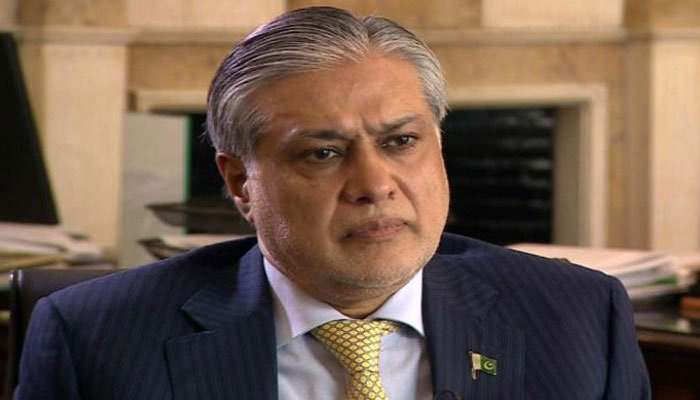Govt considering 50-70pc Windfall Tax on banking sector profits
A fixed tax rate from 50 to 70 percent is expected to be slapped for getting revenues out of the lofty profits earned by the banks, sources say
ISLAMABAD: The government is contemplating its options for slapping a Windfall Tax on the profits of banking sector in the range of 50 to 70 percent just on the pattern of the Western world, which imposed the same tax on energy companies.
“Different proposals are under consideration for imposing the Windfall Tax on profits earned by the banking sector. A fixed tax rate from 50 to 70 percent is expected to be slapped for getting revenues out of the lofty profits earned by the banks,” top official sources said while talking to The News here on Thursday.
However, official sources in the FBR said that the proposal was not yet approved by the government though Minister for Finance Ishaq Dar had hinted in his press briefing on Wednesday that the government would move ahead with the Windfall Tax on banking sector.
The government is ascertaining the exact levels of windfall profits extracted by the banking sector through recent currency manipulation. The policymakers may slap a tax at a rate whereby there is no threat of choking the banking sector. The tax officials who are working on this proposal studied the Windfall Tax imposed by the UK, Austria, Italy, Australia and other countries whereby the energy companies had earned lofty profits in the aftermath of Russia-Ukraine war, so the respective governments had imposed the Windfall Tax to generate tax revenues. Even the Biden administration in the USA had threatened to impose Windfall Tax.
The recent energy crisis across Europe as a result of Covid, poor market decisions and the Ukraine war have pushed energy prices to all-time high. Countries across Europe were moving to build up reserves in the face of restricted gas supplies to minimise the effects of a cold winter. At the same time, some governments were even considering country-wide blackouts and energy rationing to ensure that, at the very least, there was enough gas to heat homes.
“The government expects that in case of imposition of 50 to 70 percent fixed tax rate on lofty bank profits, the government can fetch Rs25 to Rs35 billion revenue generation,” said one top official.
On the proposed Flood Levy, the government might grant an exemption on import of basic food items and raw materials of essential or life-saving drugs. The flood levy could be in the range of 1 to 3 percent on all other imported items. It is estimated that the government can fetch Rs60 billion in the remaining six months of the current fiscal year 2022-23.
Sources said the government will prefer the Flood Levy because it will not become a part of the Federal Divisible Pool (FDP) under the NFC Award for distribution among the provinces, so the collected money will only be used by the federal government.
On the other hand, the FBR seeks to meet the annual tax collection target of Rs7,470 billion for the current fiscal year and has so far collected Rs3,428 billion in the first six months (July-Dec) period. Now the Board will have to collect Rs4,042 billion for materialising the desired tax collection target till June 30, 2022.
-
 Andrew's Epstein Scandal: Will King Charles Abdicate Following King Edward's Footsteps?
Andrew's Epstein Scandal: Will King Charles Abdicate Following King Edward's Footsteps? -
 Billy Joel Leaves Loved Ones Worried With His 'dangerous' Comeback
Billy Joel Leaves Loved Ones Worried With His 'dangerous' Comeback -
 Prince William Dodges Humiliating Question In Saudi Arabia
Prince William Dodges Humiliating Question In Saudi Arabia -
 Dax Shepard Describes 'peaceful' Feeling During Near-fatal Crash
Dax Shepard Describes 'peaceful' Feeling During Near-fatal Crash -
 Steve Martin Says THIS Film Has His Most Funny Scene
Steve Martin Says THIS Film Has His Most Funny Scene -
 Kensington Palace Shares Update As Prince William Continues Saudi Arabia Visit
Kensington Palace Shares Update As Prince William Continues Saudi Arabia Visit -
 Fugitive Crypto Scammer Jailed For 20 Years In $73m Global Fraud
Fugitive Crypto Scammer Jailed For 20 Years In $73m Global Fraud -
 Will Andrew Mountbatten-Windsor Finally Go To Jail Now That King Charles Has Spoken Out? Expert Answers
Will Andrew Mountbatten-Windsor Finally Go To Jail Now That King Charles Has Spoken Out? Expert Answers -
 Melissa McCarthy Reveals Her Tried And Tested ‘corpse’ Night Time Routine That’s Lost Her 95lbs
Melissa McCarthy Reveals Her Tried And Tested ‘corpse’ Night Time Routine That’s Lost Her 95lbs -
 Horrifying Pictures Of The Kidnapper Of Savannah Guthrie's Mother Released
Horrifying Pictures Of The Kidnapper Of Savannah Guthrie's Mother Released -
 Andrew's Ex-girlfriend Launches Brazen Attack On Epstein Victims On Piers Morgan Show
Andrew's Ex-girlfriend Launches Brazen Attack On Epstein Victims On Piers Morgan Show -
 Andrew Mountbatten-Windsor 'on His Own' As Palace Gives Green Light To Law Enforcement
Andrew Mountbatten-Windsor 'on His Own' As Palace Gives Green Light To Law Enforcement -
 Kanye West's Tweet About Super Bowl Halftime Resurfaced After Bad Bunny's Show
Kanye West's Tweet About Super Bowl Halftime Resurfaced After Bad Bunny's Show -
 'FBI' Star Juliana Aidén Martinez Tease Her Return To 'Law And Order: SVU' After Quitting
'FBI' Star Juliana Aidén Martinez Tease Her Return To 'Law And Order: SVU' After Quitting -
 Cardi B's Emotional Words To Pal Amid Stefon Diggs Rumored Breakup Revealed
Cardi B's Emotional Words To Pal Amid Stefon Diggs Rumored Breakup Revealed -
 Princess Eugenie Breaks Cover Amid Explosive Family Scandal
Princess Eugenie Breaks Cover Amid Explosive Family Scandal




